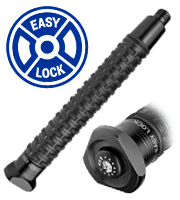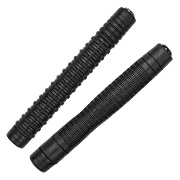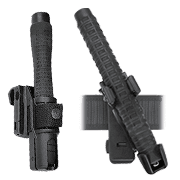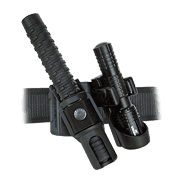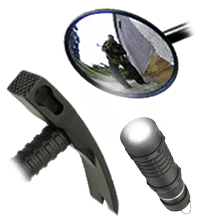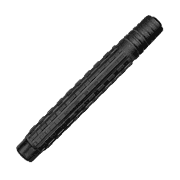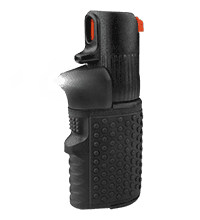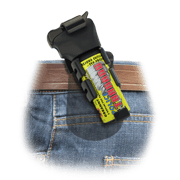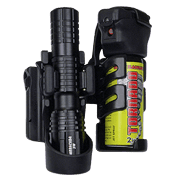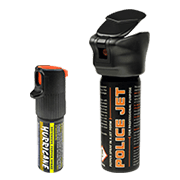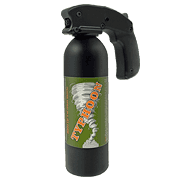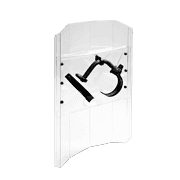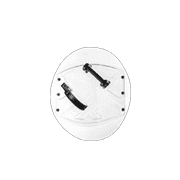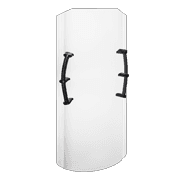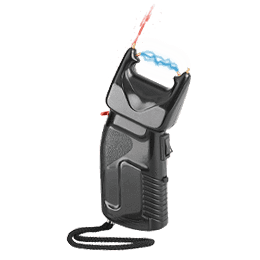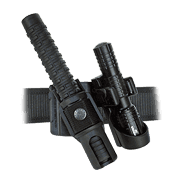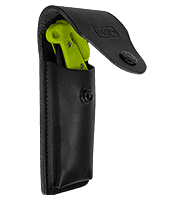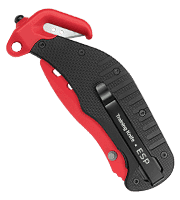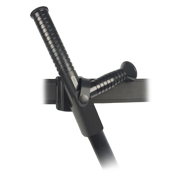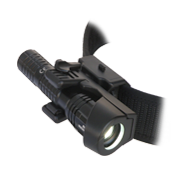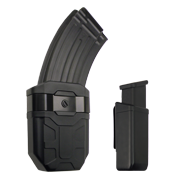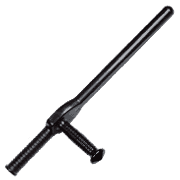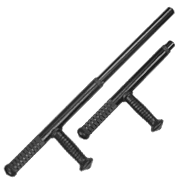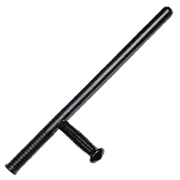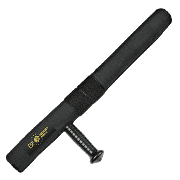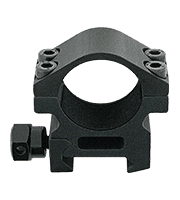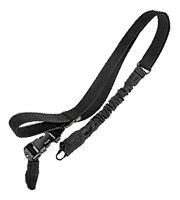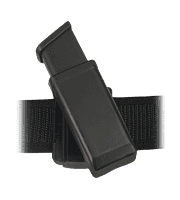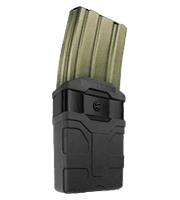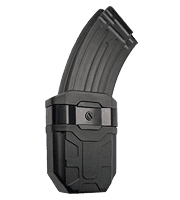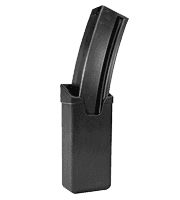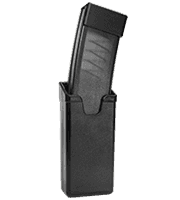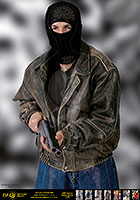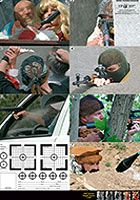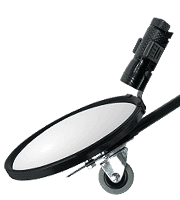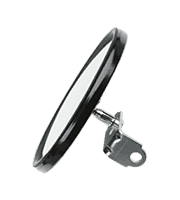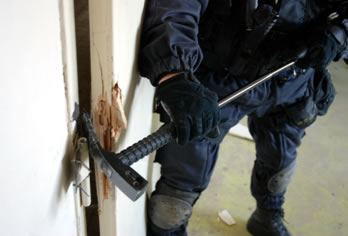 This special accessory for expandable ESP baton is especially determined for the use by security and rescue services. Its purpose is clear – to have at the disposal an alternative tool for activities which require more than just your bare hands …
This special accessory for expandable ESP baton is especially determined for the use by security and rescue services. Its purpose is clear – to have at the disposal an alternative tool for activities which require more than just your bare hands …
The tool versus your bare hands
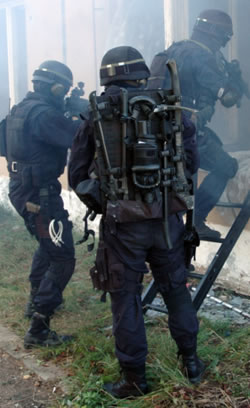 A man has started to differ from animals during evolution mostly by his will to develop tools and to use them in a meaningful way. Since time immemorial, the tools allowed the man to get his livelihood and ensure his effective defence. Even today, in our technological era, some unfortunate situations can occur, in which the human strength itself might not be enough when a suitable tool is unavailable. In addition, it might be a key activity at that moment, on which human lives could depend. This is especially true for professions the primary objective of whose is to ensure safety of us all – may they be members of armed units, or those whose task is to rescue us at the most risky moments like, for example, accidents, fires, or natural disasters. In such situations they might need, for example, to enter premises forcefully. Sometimes, that might mean the removal of doors or gates by an emergency Police squad during an action against a dangerous criminal, or, at other times, an entry into an object in fire or the urgent opening of a crashed vehicle.
A man has started to differ from animals during evolution mostly by his will to develop tools and to use them in a meaningful way. Since time immemorial, the tools allowed the man to get his livelihood and ensure his effective defence. Even today, in our technological era, some unfortunate situations can occur, in which the human strength itself might not be enough when a suitable tool is unavailable. In addition, it might be a key activity at that moment, on which human lives could depend. This is especially true for professions the primary objective of whose is to ensure safety of us all – may they be members of armed units, or those whose task is to rescue us at the most risky moments like, for example, accidents, fires, or natural disasters. In such situations they might need, for example, to enter premises forcefully. Sometimes, that might mean the removal of doors or gates by an emergency Police squad during an action against a dangerous criminal, or, at other times, an entry into an object in fire or the urgent opening of a crashed vehicle.
In the case of Police forces, the use of strength for the entry into an object presents the most typical activity taken by their special arresting and emergency squads. Such an action usually requires special opening sets consisting of various rams, crowbars, axes, or pneumatic devices often supported by shotguns loaded with smashing ammunition. All these pieces of equipment are heavy and bulky and must be often placed on the back of one or more team members. Sometimes, they are carried by hands to the specific place where the required action should take place. However, it is also true that such a specialised set is not always at the disposal when needed. Number of reasons exist for that. The squad might not possess the right “rig” (it happens surprisingly quite often…) or there are other reasons – the necessary tools are momentarily at the other side of the building, or in the neighbouring object. They might be also left in a vehicle or at the base because there was no expectation of their use during the prepared action. Then, there is a dilemma what to do. No suitable equipment is at hand. The suspect is inside, but there is no way to approach him. The squad thus loses the chance to surprise the suspect in his bed defenceless. He might wake up at any moment and pull out his machinegun from somewhere. And that might present the real problem.
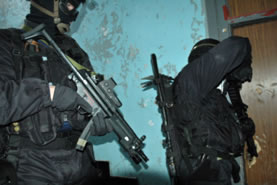 |
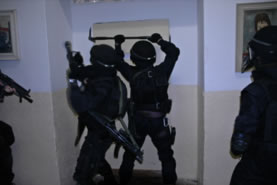 |
Trouble of many squads
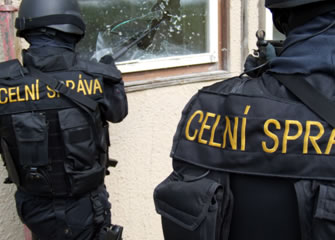 However, having a suitable aid at hand is not exclusively the benefit for elite squads only. Even ordinary Policemen and Policewomen might need to use force for the urgent opening of doors. Surprisingly many scenarios of such situations exist in Police practice. For example, they are called to an elderly person requiring an urgent help. He or she cannot reach his or her medicine and has no strength to open the door. Or, even more ordinary situation… Ms. Novak prepares a soup and leaves to ask her neighbour for some ingredient. The draught slams the door and the key is inside. Both ladies, in panic that the flat can get in fire, call for help. A couple of Policemen come, but what should they do? Call a locksmith? That can take too long… Similar situations occur also when an object should be opened because there might be a dead person inside. A specialised service, which could open the object in a professional way, can come only after several hours and the Policeman (together with the necessary witnesses) might take the required action much faster. The question is again which tool to use… Or a different case – Policemen from an emergency unit should enter an object urgently. A lawful reason may be for that (this has been broadly extended since the new Police Act was passed), but the urgent entry is prevented by a chain or a big padlock on the gates. Members of the Customs Service might experience the same problems when entering warehouses or storerooms in market halls. Vietnamese traders usually get away quickly and their storerooms are safely locked…
However, having a suitable aid at hand is not exclusively the benefit for elite squads only. Even ordinary Policemen and Policewomen might need to use force for the urgent opening of doors. Surprisingly many scenarios of such situations exist in Police practice. For example, they are called to an elderly person requiring an urgent help. He or she cannot reach his or her medicine and has no strength to open the door. Or, even more ordinary situation… Ms. Novak prepares a soup and leaves to ask her neighbour for some ingredient. The draught slams the door and the key is inside. Both ladies, in panic that the flat can get in fire, call for help. A couple of Policemen come, but what should they do? Call a locksmith? That can take too long… Similar situations occur also when an object should be opened because there might be a dead person inside. A specialised service, which could open the object in a professional way, can come only after several hours and the Policeman (together with the necessary witnesses) might take the required action much faster. The question is again which tool to use… Or a different case – Policemen from an emergency unit should enter an object urgently. A lawful reason may be for that (this has been broadly extended since the new Police Act was passed), but the urgent entry is prevented by a chain or a big padlock on the gates. Members of the Customs Service might experience the same problems when entering warehouses or storerooms in market halls. Vietnamese traders usually get away quickly and their storerooms are safely locked…
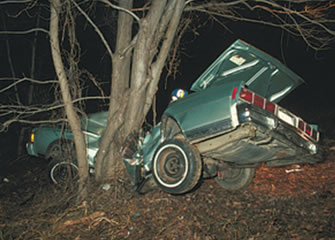 Fire-fighters and rescuers also need alternative aids at times. Of course, they have usually modern and very efficient equipment in such situations. They can handle any door with ease and they can get people out from crashed cars quickly. However, the place of an accident might be difficult to get to, the road is not passable, the object is completely inaccessible because of floods, or the vehicle rolled down the slope into a thick forest after the collision. Many problems can be encountered. Heavy equipment cannot be used and the rescue team might be helpless and empty handed in the place…
Fire-fighters and rescuers also need alternative aids at times. Of course, they have usually modern and very efficient equipment in such situations. They can handle any door with ease and they can get people out from crashed cars quickly. However, the place of an accident might be difficult to get to, the road is not passable, the object is completely inaccessible because of floods, or the vehicle rolled down the slope into a thick forest after the collision. Many problems can be encountered. Heavy equipment cannot be used and the rescue team might be helpless and empty handed in the place…
The search for a suitable tool
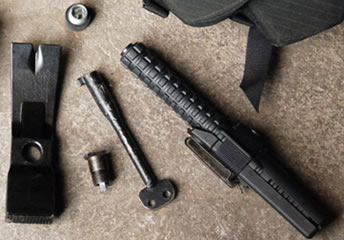 The described situations are well known by many whose job descriptions include the “help and protection”. These people have asked for a suitable tool, which could resolve some of the most unpleasant moments in certain situations, for a long time. It should resolve especially the problem of wrenching something off (e.g. of the mentioned padlock), but also the problem of a forced entry, when the opening should occur in our direction. These situations are the worst. Even the door, which a well-built person can easily kick in the out direction (or smash with a fire extinguisher), can present a problem when the opening goes in the opposite direction. It is sometimes completely impossible to get inside. Even an ordinarily resistant door might mean the fatal delay in the risky action, or the end of hopes put into the rescue activity. Other features of the required tool, in addition to the necessary compactness and reasonable weight, should be the possibilities to use it as a hammer, or for the lock breaking. Not all actions in practice require the complete door smashing, especially when the door might be very expensive. That would mean inappropriate destruction sometimes because of a trivial issue. Fire-fighters (and in fact also experienced thieves focussing on apartments…) know that well – doors, which are not equipped with advanced safety features, need just breaking of the door lock and its removal. Then, the inside mechanism needs to be easily turned. A Police squad sometimes prefers such a discreet entry too. The silent breaking in through the building entrance door and discreet reaching of the key apartment, where the suspect is present, seems to be definitively a much better idea when compared with the desperate use of neighbours’ doorbells. And that happened again surprisingly often in practice.
The described situations are well known by many whose job descriptions include the “help and protection”. These people have asked for a suitable tool, which could resolve some of the most unpleasant moments in certain situations, for a long time. It should resolve especially the problem of wrenching something off (e.g. of the mentioned padlock), but also the problem of a forced entry, when the opening should occur in our direction. These situations are the worst. Even the door, which a well-built person can easily kick in the out direction (or smash with a fire extinguisher), can present a problem when the opening goes in the opposite direction. It is sometimes completely impossible to get inside. Even an ordinarily resistant door might mean the fatal delay in the risky action, or the end of hopes put into the rescue activity. Other features of the required tool, in addition to the necessary compactness and reasonable weight, should be the possibilities to use it as a hammer, or for the lock breaking. Not all actions in practice require the complete door smashing, especially when the door might be very expensive. That would mean inappropriate destruction sometimes because of a trivial issue. Fire-fighters (and in fact also experienced thieves focussing on apartments…) know that well – doors, which are not equipped with advanced safety features, need just breaking of the door lock and its removal. Then, the inside mechanism needs to be easily turned. A Police squad sometimes prefers such a discreet entry too. The silent breaking in through the building entrance door and discreet reaching of the key apartment, where the suspect is present, seems to be definitively a much better idea when compared with the desperate use of neighbours’ doorbells. And that happened again surprisingly often in practice.
The opening baton accessory
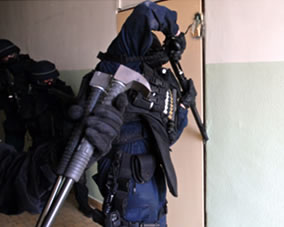 The well-known ESP firm started to consider these problems several years ago after they had heard about the issue from many members of various armed forces. This is a company with its headquarters in Prague, which is often inspired, when it comes to its assortment, by demands and professional opinions of those who use the products when executing their demanding and often risky jobs. As a hardened expandable baton makes one of its main and traditional products, the idea to prepare a special accessory, which could be easily and quickly installed on this coercive tool, was only logical. The expandable baton by “ESP”, whose above-standard resistance has been well verified in numerous tests and also during the across the board intensive use in Police practice, has been ideal for the purpose. The design of an extension, which should fulfil the demanding requirements, was the next step.
The well-known ESP firm started to consider these problems several years ago after they had heard about the issue from many members of various armed forces. This is a company with its headquarters in Prague, which is often inspired, when it comes to its assortment, by demands and professional opinions of those who use the products when executing their demanding and often risky jobs. As a hardened expandable baton makes one of its main and traditional products, the idea to prepare a special accessory, which could be easily and quickly installed on this coercive tool, was only logical. The expandable baton by “ESP”, whose above-standard resistance has been well verified in numerous tests and also during the across the board intensive use in Police practice, has been ideal for the purpose. The design of an extension, which should fulfil the demanding requirements, was the next step.
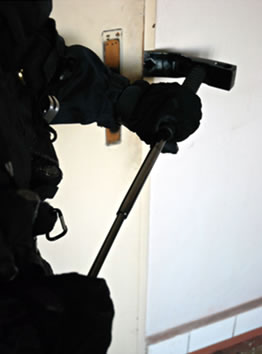 Many experiments were carried out with devices designed, manufactured, and then found unsuccessful by demanding tests. The special tool was changing its design many times. The designers worked very hard and people in workshops tried to put their ideas into practice. Many units, including the antiterrorist Police squad, participated in the tests of new prototypes. Consequently, the valuable feedback allowed the development of new properties and more optimal solutions. The objective was clear – to develop something which would provide the real chance of the task fulfilment, even if it would mean, for example, the complete destruction of the opening tool or of the resistant ESP baton, which is exposed to an extreme pull in such situations (but how do you want to compare the price of the destroyed baton with the value of an arrested dangerous criminal or the life of a rescued person…). We all knew well what we wished for – the not naive search of a good replacement for the special technological devices. We wanted an alternative, a safety device, which would be always available and ready for the use. It was supposed to replace, at least partly, the missing standard equipment in the combination with the usual equipment – the baton. It was about the better chance in situations where there is a threat of the total failure.
Many experiments were carried out with devices designed, manufactured, and then found unsuccessful by demanding tests. The special tool was changing its design many times. The designers worked very hard and people in workshops tried to put their ideas into practice. Many units, including the antiterrorist Police squad, participated in the tests of new prototypes. Consequently, the valuable feedback allowed the development of new properties and more optimal solutions. The objective was clear – to develop something which would provide the real chance of the task fulfilment, even if it would mean, for example, the complete destruction of the opening tool or of the resistant ESP baton, which is exposed to an extreme pull in such situations (but how do you want to compare the price of the destroyed baton with the value of an arrested dangerous criminal or the life of a rescued person…). We all knew well what we wished for – the not naive search of a good replacement for the special technological devices. We wanted an alternative, a safety device, which would be always available and ready for the use. It was supposed to replace, at least partly, the missing standard equipment in the combination with the usual equipment – the baton. It was about the better chance in situations where there is a threat of the total failure.
Handy service “openers”
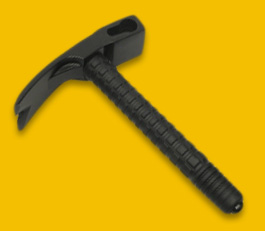 In the end, we have developed a tool which, according to opinions of many specialists from special squads, has become the world unique, but also really functional and practical. The new tool is put together with two parts, because of the necessary compactness, and can be screwed on the ESP baton replacing the usual end part. Consequently, thanks to the integrated fixing springs, it can function as the classical end part. The baton with the installed device could be fitted also in the closed baton situation (in such a way that it does not obstruct and is prepared for the action start…). This robust and multipurpose tool offers a wide spectrum of use. The large sharp and hooked shape allows for wrenching hinges off, or for the prising door open on the lock side.
In the end, we have developed a tool which, according to opinions of many specialists from special squads, has become the world unique, but also really functional and practical. The new tool is put together with two parts, because of the necessary compactness, and can be screwed on the ESP baton replacing the usual end part. Consequently, thanks to the integrated fixing springs, it can function as the classical end part. The baton with the installed device could be fitted also in the closed baton situation (in such a way that it does not obstruct and is prepared for the action start…). This robust and multipurpose tool offers a wide spectrum of use. The large sharp and hooked shape allows for wrenching hinges off, or for the prising door open on the lock side.
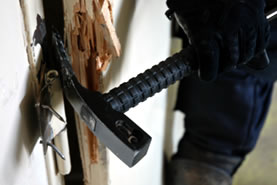 |
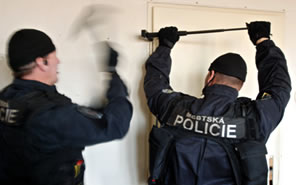 |
The cut out in the centre is determined for possible bolt extraction. The rear big flat part serves as an efficient hammer. The application in real situations is quite simple – one team member sets the device on the targeted place, while the second Policeperson hammers the sharp end inside with his completed set. It is simple – when the device sharp end is not deep enough, there will be nothing to prise open.
Deep cut outs are on both sides of the extension. They have the size of a standard lock insert. They thus allow for the placing of the tool from the left or right, according to the lock placement. And, then, there is just the sound of a “clunk”…
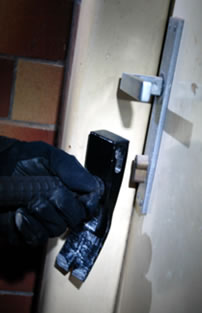 |
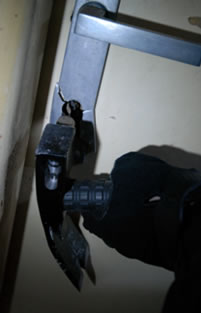 |
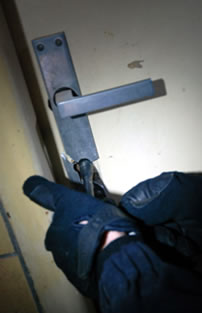 |
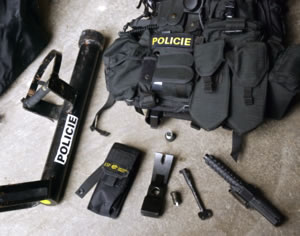 High quality steel was used in the manufacture of the device and the decisive parts are appropriately hardened. However, the users have not considered only the functionality and reliability of the new product since the start and they have regarded the price of this novelty also as important. The design order indicated that the price should not exceed much the value of a new expandable baton. The unusual “opener” will be supplemented in near future with a special “key” (but only for members of official armed units…) allowing the entry after the breaking of a lock insert and, possibly, also with a special metal strip for the opening of handles, or for the pushing in catches of entry doors of flats in panel-built housing blocks. A special holder will also be soon available for the complete set. Thanks to a suspension system, it will allow for fitting on a belt or on the modern tactical vest equipped with the popular US suspension system M.O.L.L.E.
High quality steel was used in the manufacture of the device and the decisive parts are appropriately hardened. However, the users have not considered only the functionality and reliability of the new product since the start and they have regarded the price of this novelty also as important. The design order indicated that the price should not exceed much the value of a new expandable baton. The unusual “opener” will be supplemented in near future with a special “key” (but only for members of official armed units…) allowing the entry after the breaking of a lock insert and, possibly, also with a special metal strip for the opening of handles, or for the pushing in catches of entry doors of flats in panel-built housing blocks. A special holder will also be soon available for the complete set. Thanks to a suspension system, it will allow for fitting on a belt or on the modern tactical vest equipped with the popular US suspension system M.O.L.L.E.
“Small brother”
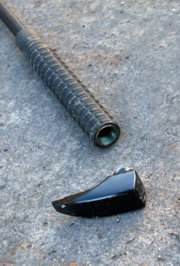 |
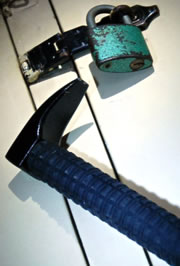 |
Even at the time when the mentioned “opening set” was developed, we were presented with some opinions that the device might be too heavy or too bulky for belts of ordinary Police personnel, especially those without a vehicle conducting their service on foot. Because of that, we concurrently worked on a smaller, much more slender device, which could become a good aid for the breaking of the already mentioned hasp and padlock. It should also serve for an easy destruction of the resistant car windows. We have thus developed a small baton ending replacement made of hardened steel, which features a hooked nose with a sharp edge. Even this design successfully combined the efficiency and small size. Everything could be comfortably carried in a small pouch equipped with a belt clip. Some personnel have already said that they wanted to have their expandable baton equipped in this way permanently – it means having the extension, shaped as a bird of prey beak, always quickly at their disposal. During the tests, we have found that the device installed on a baton does not practically obstruct usual activities and could thus be placed “handy” on the tactical vest, hanging on the steel clip. This new clever device made by ESP thus further extends the very varied possibilities of the classical enforcing tool, in addition to the torch, tactical mirror and the smashing cone, and shapes the complex concept of a multifunctional service system.
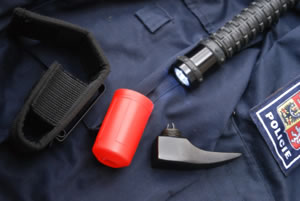 The big interest and appreciable feedback from members of the extensive spectrum of different units have clearly confirmed to us that the targeted and demanding development of new accessories was the right way to go. If these new devices contribute to better work effectiveness and safety of their users, we will be able to say that the incurred costs were well invested…
The big interest and appreciable feedback from members of the extensive spectrum of different units have clearly confirmed to us that the targeted and demanding development of new accessories was the right way to go. If these new devices contribute to better work effectiveness and safety of their users, we will be able to say that the incurred costs were well invested…
Without doubts, the development of the opening accessory was relatively long and demanding. We present some of the older samples tested in real situations. After “starting” the door with a shotgun loaded with special smashing ammunition, their key role was put into operations. That all served for the efficient and final entry by the Police emergency squad.
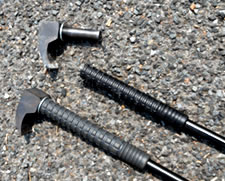 |
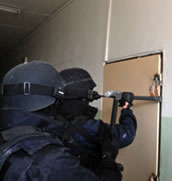 |
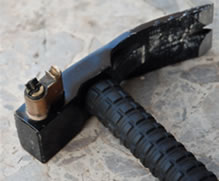 |
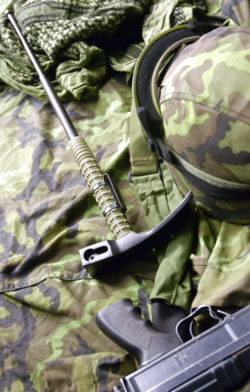 Instead of wrenching off, tearing off and hammering in, there is now another variant using this new special opening extension, which presents the chance of less forcible and more silent penetration through the door. You need just to place the side cut out in the appropriate way to the insert of the lock in question (its extension of about 2 mm is usually enough…). Then, you pull the baton handle down and the insert breaks. In the end, you put a special key into the opening and open the door…
Instead of wrenching off, tearing off and hammering in, there is now another variant using this new special opening extension, which presents the chance of less forcible and more silent penetration through the door. You need just to place the side cut out in the appropriate way to the insert of the lock in question (its extension of about 2 mm is usually enough…). Then, you pull the baton handle down and the insert breaks. In the end, you put a special key into the opening and open the door…
Some parts of the Czech Army are also interested in this novelty. And they are not only special units of the Military Police. The forcible entry is sometimes needed even during foreign missions, when the traditional means (see the photo below) are difficult because of the ammunition and water requirements.
